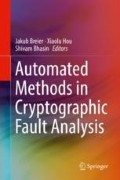Abstract
Side-channel and fault injection attacks are renown techniques to extract keys from cryptographic devices. Fortunately, leakage reduction and fault detection countermeasures exist and can be implemented right in the source-code. However, source-code level countermeasures might be altered during the compilation process. Design simulation is an effective means to detect such harmful simplifications. This is a well-known methodology to analyze regressions in terms of side-channel leakage.
In this chapter, we explain that protections against fault injection attacks are no exception. First of all, we show that vulnerabilities to those attacks can be easily detected by simulation methods. Second, we highlight that simulation techniques are also highly efficient in detecting logic simplifications which destroy (fully or partly) the countermeasures. Thus, the simulation-based methodology we present in this chapter shows that it is possible to decide quickly which compilation options are safe and which ones are detrimental to the security.
Access this chapter
Tax calculation will be finalised at checkout
Purchases are for personal use only
Notes
- 1.
In Common Criteria parlance.
References
N. Beringuier-Boher, M. Lacruche, D. El-Baze, J.-M. Dutertre, J.-B. Rigaud, P. Maurine, Body biasing injection attacks in practice, in Proceedings of the Third Workshop on Cryptography and Security in Computing Systems, CS2@HiPEAC, Prague, January 20, 2016 (ACM, New York, 2016), pp. 49–54
G. Bertoni, L. Breveglieri, I. Koren, V. Piuri, Fault detection in the advanced encryption standard, in Proceedings of the Conference on Massively Parallel Computing Systems (MPCS’02) (2002), pp. 92–97
G. Bertoni, L. Breveglieri, I. Koren, P. Maistri, V. Piuri, Error analysis and detection procedures for a hardware implementation of the advanced encryption standard. IEEE Trans. Comput. 52(4), 492–505 (2003)
C. Giraud, DFA on AES, in 4th International Conference on Advanced Encryption Standard–AES, AES 2004, Bonn, May 10–12, 2004, Revised Selected and Invited Papers (Springer, Berlin, 2004), pp. 27–41
S. Guilley, J.-L. Danger, Global faults on cryptographic circuits, Chapter 17 in Fault Analysis in Cryptography, ed. by M. Joye, M. Tunstall, vol. 147 (Springer, Heidelberg, 2012)
M. Joye, M. Tunstall, Fault Analysis in Cryptography, vol. 147 (Springer, Heidelberg, 2012)
R. Lashermes, G. Reymond, J.-M. Dutertre, J. Fournier, B. Robisson, A. Tria, A DFA on AES based on the entropy of error distributions, in 2012 Workshop on Fault Diagnosis and Tolerance in Cryptography, ed. by IEEE (IEEE, Piscataway, 2012), pp. 34–43
H. Li, A.T. Markettos, S.W. Moore, Security evaluation against electromagnetic analysis at design time, in Proceedings of the 7th International Workshop on Cryptographic Hardware and Embedded Systems–CHES 2005, Edinburgh, August 29–September 1, 2005 (Springer, Berlin, 2005), pp. 280–292
Secure-IC S.A.S. Virtualyzr ® tool. http://www.secure-ic.com/solutions/virtualyzr/. Accessed 2 Nov 2018
N. Selmane, S. Guilley, J.-L. Danger, Setup time violation attacks on AES, in EDCC, The seventh European Dependable Computing Conference (IEEE, Piscataway, 2008), pp. 91–96, ISBN: 978-0-7695-3138-0. https://doi.org/10.1109/EDCC-7.2008.11
S. Takarabt, K. Chibani, A. Facon, S. Guilley, Y. Mathieu, L. Sauvage, Y. Souissi, Pre-silicon embedded system evaluation as new EDA tool for security verification, in 3rd IEEE International Verification and Security Workshop, IVSW 2018, Costa Brava, July 2–4, 2018 (IEEE, Piscataway, 2018), pp. 74–79
Acknowledgements
This work has benefited from a funding via TeamPlay (https://teamplay-h2020.eu/), a project from European Union’s Horizon2020 research and innovation programme, under grant agreement No. 779882. Besides, the French FUI program CSAFE+ also funded part of this work.
Author information
Authors and Affiliations
Corresponding author
Editor information
Editors and Affiliations
Rights and permissions
Copyright information
© 2019 Springer Nature Switzerland AG
About this chapter
Cite this chapter
Chibani, K. et al. (2019). Fault Analysis Assisted by Simulation. In: Breier, J., Hou, X., Bhasin, S. (eds) Automated Methods in Cryptographic Fault Analysis. Springer, Cham. https://doi.org/10.1007/978-3-030-11333-9_12
Download citation
DOI: https://doi.org/10.1007/978-3-030-11333-9_12
Published:
Publisher Name: Springer, Cham
Print ISBN: 978-3-030-11332-2
Online ISBN: 978-3-030-11333-9
eBook Packages: EngineeringEngineering (R0)

